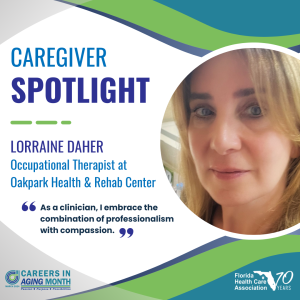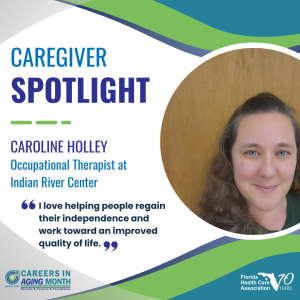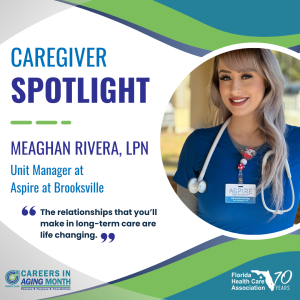Careers in Aging Caregiver Profile
Lorraine A. Daher, MS OTR/L, Occupational Therapist at Oakpark Health & Rehabilitation Center in Palm Harbor
 I have worked as an Occupational Therapist in a skilled nursing facility for the past 19 years. My career as an Occupational Therapist began in 1993 working in mental health, in an acute psychiatric unit in Massachusetts.
I have worked as an Occupational Therapist in a skilled nursing facility for the past 19 years. My career as an Occupational Therapist began in 1993 working in mental health, in an acute psychiatric unit in Massachusetts.
l spent 12 wonderful years working to help acutely impaired patients, most of them dual diagnosis (mental health diagnosis as well as substance abuse/dependence). When I moved to Florida with my husband and children, I was fortunate to begin working in skilled nursing facilities with acute, subacute, and long-term care patients.
This is when and where I truly found that my basic education and experience in mental health, as well as my knowledge of understanding what it means to be holistic, was not only an asset in my role as a therapist, but also a necessary part of being an Occupational Therapist.
I am a very cognitive-based Occupational Therapist who truly believes in the importance of understanding cognition – how the brain works and how it impacts every part of our function. Assessment and treatment to address this area of function is the basis for understanding the physical function of the individual, hence holistic, hence true occupational therapy intervention.
l initially received a Bachelor of Science in Occupational Therapy in 1992, then advanced my education with a master’s degree in Non-Profit Management in 1999.
One of the best parts of working in long-term care is the connection with our residents. Whether or not they are in therapy for a brief time, or an extended amount of time, it is an opportunity for us as clinicians to optimize the patient’s function and safety. We are fortunate to use our basic skills and personalize them to meet the patient’s needs and improve their quality of life. When we see the long-term care residents in the facility; this is their home, and we are the guests. We must respect them and their needs.
Some of the qualities I embrace as a clinician is professionalism with compassion. With these two qualities it is possible to effectively intervene. We as clinicians are trained to start the intervention process by reviewing the patient’s history; however, it is only when we meet the patient in person that the true intervention takes place. We must have active listening skills and patience, along with keen observation to communicate with patients and to understand what the patient is telling us. With this combination, the process can only be successful.
It is also important that we work as a team; it is never about my or your skills alone, but instead the combination of all our skills together with a sense of humbleness. No one is the star clinician.
To anyone considering working in long-term care setting, I would first say to be sure you bring with you, along with your basic education and experience, your heart. Bring with you a sense of caring and desire to facilitate change, to make a positive difference in the quality of one’s life.
 While working in a camp for visually impaired children, the children often told me how their occupational therapist was the one who helped teach them how to do daily skills, and they would show me the adaptations they had in place at home. This inspired me to pursue a career in occupational therapy.
While working in a camp for visually impaired children, the children often told me how their occupational therapist was the one who helped teach them how to do daily skills, and they would show me the adaptations they had in place at home. This inspired me to pursue a career in occupational therapy. As the Activities Director at Island Lake Center, I have found my true calling. I can spend quality time with my residents each day, and the smiles on their faces are my validation that I am exactly where I am supposed to be.
As the Activities Director at Island Lake Center, I have found my true calling. I can spend quality time with my residents each day, and the smiles on their faces are my validation that I am exactly where I am supposed to be. I wanted to become a nurse from a very young age. Reading about diseases in medicals books and encyclopedias and having a mother who was often ill inspired me to become a nurse. I started my career in long-term care almost 31 years ago as a Certified Nursing Assistant (CNA). I went on to become a Licensed Practical Nurse (LPN), earn an associate degree in nursing and lastly, a Bachelor of Science degree in nursing from the Florida State College of Jacksonville.
I wanted to become a nurse from a very young age. Reading about diseases in medicals books and encyclopedias and having a mother who was often ill inspired me to become a nurse. I started my career in long-term care almost 31 years ago as a Certified Nursing Assistant (CNA). I went on to become a Licensed Practical Nurse (LPN), earn an associate degree in nursing and lastly, a Bachelor of Science degree in nursing from the Florida State College of Jacksonville. My career in rehabilitation and long-term care (LTC) started in 2014. I had always aspired to become a nurse and started my journey as a staffing coordinator for a local long-term care facility. During this time, I worked my way up to admissions coordinator, and then branched into an outside marketing liaison.
My career in rehabilitation and long-term care (LTC) started in 2014. I had always aspired to become a nurse and started my journey as a staffing coordinator for a local long-term care facility. During this time, I worked my way up to admissions coordinator, and then branched into an outside marketing liaison.